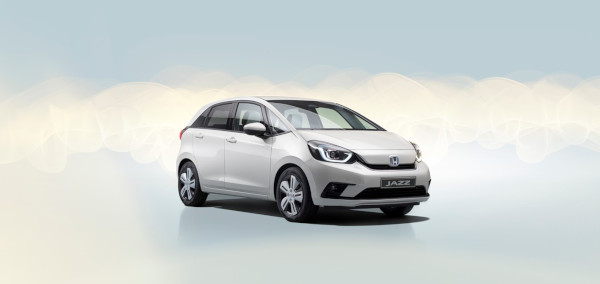Next generation of iconic Jazz features two-motor hybrid technology as standard
• “e:HEV” hybrid technology delivers outstanding refinement and efficiency
• All-new Jazz first to feature “e:Technology” branding that will spread to all of Honda’s future electrified products
• Addition of new ‘Crosstar’ variant
• Advanced connectivity provides an intuitive user interface and wireless smartphone mirroring capability
• Class-leading space retained, with significantly improved comfort levels
• Improved SENSING safety system
• New Jazz launched in European markets in 2020
Honda has unveiled the all-new Jazz, featuring advanced two-motor hybrid powertrain technology as standard for the first time. The new generation of the popular B-segment hatchback builds on the class-leading comfort and space Jazz is known for with exceptional “EV-like” driving dynamics and advanced technology and safety features.
The new Jazz will introduce the efficiency benefits and performance of hybrid power to the mass market and accelerate Honda towards achieving its ambition of all its European mainstream models to feature electrified powertrains by 2022.
The next-generation Jazz will be the first model in Honda’s European line-up to wear the new “e:HEV” powertrain badging. This is the first example of “Honda e:Technology” branding that will feature across all future electrified products.

New Crosstar variant unveiled
Another addition to the Jazz range is the new ‘Crosstar’ variant, designed to appeal to those seeking a more crossover style design. Available with the same hybrid powertrain and interior features as the standard model, the new Crosstar features increased ride height, a unique front grille design, water-resistant upholstery and integrated roof rails.
New minimalist clean design
Honda’s next-generation B-segment hatchback presents an evolution of the instantly recognisable monospace silhouette of the Jazz. The seamless, clean design philosophy that will define future Honda models follows the key concepts of function and beauty first seen in the Honda e.
Thanks to new structural technologies, the A-pillar is half the width of that on the previous model, improving forward horizontal visibility. The sleek A-pillar design is enabled by greatly improved torsional rigidity and new structural technologies that move impact stress towards the front quarter light pillars.
Natural, crisp lines run horizontally along the sides of the car, with a fresh simplicity of form. The sharper, more vertical shoulder lines emphasise the rear fender and wheel arches, reinforcing the car’s broader stance and sense of stability. The rear design of the car echoes the clean lines at the front, with a sleek new horizontal light cluster layout and discrete roof spoiler.
Outstanding hybrid performance: e:HEV
For the first time ever in Europe, Jazz will only be available with an advanced two-motor hybrid powertrain, which provides an exceptional blend of strong and effortless driving performance and impressive fuel economy. The system is newly developed for Jazz and provides a smooth, responsive and direct driving feel.
New intuitive connectivity
Intuitive infotainment technology with seamless in-car connectivity and a WiFi hotspot ensure occupants can stay connected with everyday life. The new LCD touchscreen interface features familiar smartphone-style usability, with swipe controls to browse recently used applications and media lists. The comprehensive suite of in-built apps can be supplemented by seamless smartphone mirroring, via built-in Android Auto and Apple CarPlay, which is available for Jazz occupants via a wireless connection for the first time.
Interior: quality and comfort
The interior quality of the all-new Jazz provides levels of comfort and spaciousness unrivalled in the B-segment.
The contemporary interior layout echoes the clean look of the exterior, complemented with an uncluttered, user-friendly instrument panel. The wide centre console armrest also echoes interior specifications of higher segment cars.
New wider, body-stabilizing front seats feature mat-structure support, replacing the previous spring set-up, to help prevent fatigue on long journeys. Improved rear-seat design and a thicker rear seat pad provides greater comfort for passengers too.
The thin A-pillar design improves horizontal visibility comfort for occupants, with the abundance of natural light through the expansive windscreen and front quarter lights serving to enhance the sense of spaciousness in the cabin.
Clever packaging retains unrivalled space
The all-new Jazz retains class-leading levels of interior space that was the hallmark of previous generations through the clever packaging of hybrid drivetrain components into the chassis and within the engine bay. Key to maximising cabin room is the positioning of the fuel tank in the centre of the chassis beneath the front seats, which is unique in this class. This enables the Jazz to retain the exceptionally versatile rear Magic Seats that offer both “fold-flat” or “flip-up” seat flexibility, depending on cargo space required.
Honda Sensing provides comprehensive safety package
To complete the strong package of the new Jazz, Honda provides the most comprehensive suite of advanced safety features and driver aids in its class.
The scope of the brand’s Honda Sensing technology has been enhanced with the application of a new wider, higher-definition camera, replacing the previous camera and radar set-up. This enables improved awareness of vehicle surroundings, including recognition of verges without kerbs or roadside markings.
The Collision Mitigation Brake System (CMBS) is improved with night-time operation to detect pedestrians and cyclists when there is no street lighting, and now applies the brakes when oncoming vehicles cut across or turn into the path of the car. The new camera system also enables Adaptive Cruise Control (ACC) to follow traffic at low speeds in congestion and applies Lane Keep Assist on urban and rural roads – as well as multi-lane highways – for increased safety in more situations.
Sales of the next-generation Honda Jazz for European markets is set to start in mid-2020.



